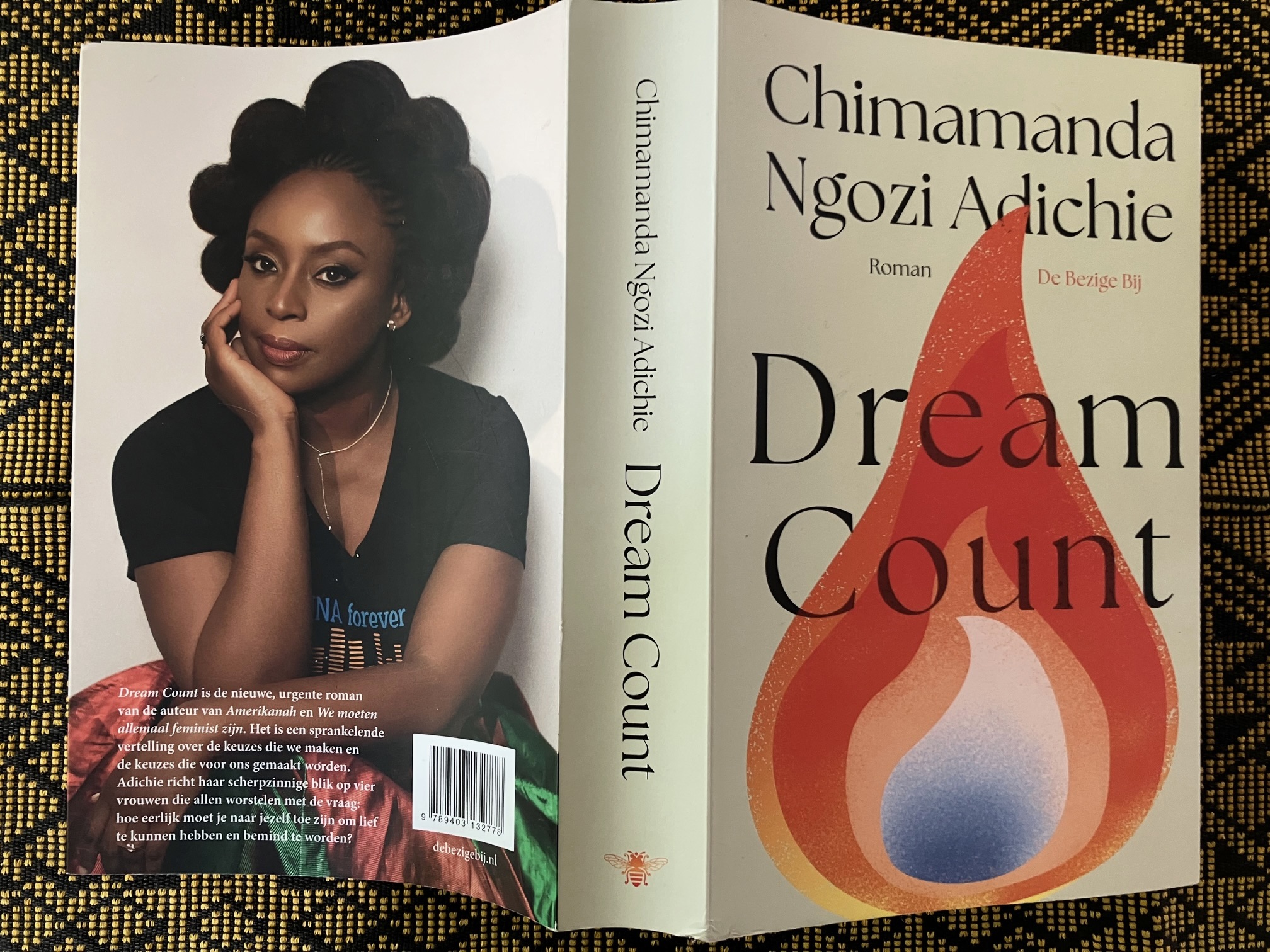Despite initial hesitations, Dayo Macaulay absolutely recommends the novel Dream Count.
Dream Count by Chimamanda Ngozi Adichie is a book about the lives of numerous women, set in Guinea, Nigeria and the US, and told through the lens and experiences of four women – Chia, Zikora, Kadiatou and Omelogor. Through them, we also get a look into the lives, if sometimes briefly, of Binta (Kadiatou’s sister), Zikora’s mom, Hauwa, Atasi, and the dynamics of various mother-daughter relationships.
Numerous themes are explored in the book, such as educational systems across countries, socio-cultural interactions influenced by locations and backgrounds, dating, the pressure of being unmarried, female genital mutilation (FGM), (interracial) relationships, sex education, co-existence of poverty and affluence in Africa, migration patterns, the hypocritical conservatism practiced in Nigeria and the singularity of America’s liberalism not always obvious to Americans. It also touches upon the fluidity of definitions of racism, liberalism, morality, corruption, slavery and (in)justice.
Eager to please
The start of the book felt initially tedious, and Chia’s story reminded me too much of Americanah (Adichie's previous book). Chia seemed to lack depth, and immediately obvious was her wealth, beauty and the array of men (dream count), which was also perceived through the men’s satisfaction or dissatisfaction with her. She seemed to have no opinion, was constantly eager to please and often non-confrontational.
However, I started to question if I was not guilty of the same sin as people who wondered why there should be any interest in Chia’s stories , a rich black girl’s travels, which is ironic considering many of Chia’s experiences are also mine. I fell into the trap of wanting a more ‘authentic African or black girl’ story – poverty or trauma porn.
Literacy, individualism and opinions are vivid and bold in Africa
Chimamanda Ngozi Adichie clearly highlights that our stories are as diverse as we are many in Africa. In the same way, there were debates within Darnell’s academic circle in America and similar discourses were ongoing in Omelogor’s living room in Nigeria – literacy, individualism and opinions are vivid and bold in Africa. Tourism isn’t exclusive to Westerners alone; it is a pastime enjoyed by anyone who can afford it. This also challenges the narrative that migration from Africa is only economic, as in the case of Amadou, whereas in the case of all four women – Kadiatou, Chia, Omelogor and Zikora – their migration was not driven by economic reasons.
Kadiatou’s story proves that one can live so many lives in one lifetime. Through her content and disrupted childhood, the uncertainty of her teenage years, the superstitions and pains of her marriage and childbirth, her sojourn to and within America, and the trauma of violations by power-wielding white men (based on Strauss-Kahn), that interspersed her journey. She kept her sufferings to herself, kept ploughing forward and seems content through it all.
This quiet strength of women despite enormous pain is a recurring theme in the book: Kadiatou’s mother in the face of painful losses and societal pressure, Binta expected to remain quiet through her genital mutilation, Zikora’s mother’s resignation and refusal to display any weakness in the face of her husband’s second marriage, Zikora’s abortion and the brave face she pulled at work during her second pregnancy, even fierce Omelogor’s training of her expressions to weather the CEO’s temperament and office machinations.
Bear pain quietly
In almost all these cases, the instinct is to bear the pain quietly with almost no whimper. However, it becomes clear that Chia’s quiet strength is in her ability to provide an outlet for Zikora, Omelogor and Kadiatou by really listening and supporting them through their pain. What I initially perceived as a lack of depth and eagerness to please from Chia became the strength which gave the three other women comfort in very difficult periods.
Many of the subplots would be relatable across class, age and gender and make for very interesting and different interpretations and arguments. One only needs to situate oneself in a hair salon or barbershop and imagine a discussion about Chia’s choices in men and why she left Chuka, or the dilemma that was Kwame – how did that end, or what would you do if you were Zikora?
Expectations
It is clear, however, as Chimamanda demonstrates to the reader, that expectations of agreement along cultural identities or divisions based on cultural differences do not always hold. One would have expected that women of similar cultural origins as Kadiatou would immediately believe her on the rape incident, but Ahemen strongly expressed her disbelief of Kadiatou regardless of information presented.
I also wonder about Adichie's actual views, did she live any of these experiences?
This is my first formal book review, and I was initially overwhelmed by the enormity of the task, considering the writer’s acclaim and my initial boredom with the book. However, the more I process the characters, the more I am in awe of Chimamanda Ngozi Adichie's ability to skillfully weave such complex stories in simple bites. I am still digesting the book and trying to discern the overarching plot; nevertheless, I absolutely recommend it.
Dayo Macaulay is a financial expert and expat currently based in the Netherlands, who enjoys reading as one of her favorite pastimes. She is a member of Nigerian Youths in the Netherlands (NYN).


